|
|
|
Sort Order |
|
|
|
Items / Page
|
|
|
|
|
|
|
| Srl | Item |
| 1 |
ID:
184995
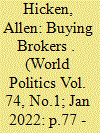

|
|
|
|
|
| Summary/Abstract |
Studies of electoral clientelism—the contingent exchange of material benefits for electoral support—frequently presume the presence of strong parties. Parties facilitate monitoring and enforcement of vote buying and allow brokers to identify core voters for turnout buying. Where money fuels campaigns but elections center around candidates, not parties, how do candidates pitch electoral handouts? The authors analyze candidates’ distribution of cash during an Indonesian election. Drawing upon varied data, including surveys of voters and brokers, candidates’ cash-distribution lists, and focus-group discussions, they find heavy spending but little evidence of vote buying or turnout buying. Instead, candidates buy brokers. With little loyalty or party brand to draw on, candidates seek to establish credibility with well-networked brokers, who then protect their turf with token payments for their own presumed bloc of voters. The authors find little evidence of monitoring of either voter or broker behavior, which is consistent with their argument that these payments are noncontingent.
|
|
|
|
|
|
|
|
|
|
|
|
|
|
|
|
| 2 |
ID:
111170
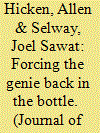

|
|
|
|
|
| Publication |
2012.
|
| Summary/Abstract |
In 2007, those behind the 2006 coup drafted a new constitution specifically aimed at turning back the political and policymaking clock to the pre-1997 era. However, in the preceding decade a significant transformation of Thai politics had taken place. Specifically, social cleavages had become politicized and particized in ways we have not seen before, and policy-focused, popular party programs had become part and parcel of serious party campaign strategies. Focusing on health policy, we thus argue in this article that institutional reforms have had predictable and observable implications for policymaking in Thailand, but only when considered in the context of changes to the broader social structure and other political conditions. While the 1997 reforms brought about a well-documented shift toward a more centralized, coordinated, and nationally focused policymaking environment, the 2007 reforms have been less successful at reversing that impact. In short, the coup makers are finding it harder than they supposed to force the genie back into the bottle.
|
|
|
|
|
|
|
|
|
|
|
|
|
|
|
|
| 3 |
ID:
176192
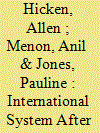

|
|
|
|
|
| Summary/Abstract |
The Trump administration sought to erode confidence in the international system, which it regarded as an affront to national sovereignty. The COVID-19 pandemic, by raising collective awareness of the need for global cooperation, may help to restore that confidence and encourage renewed commitment to multilateralism. Public opinion polls show that people around the world have greater confidence in global institutions like the World Health Organization than in national leaders like Donald Trump or Xi Jinping. The United States will continue to be an indispensable partner after Trump, but the international order will rest on a stronger footing if Washington is no longer expected to be the prime mover and contributes instead as one among equals.
|
|
|
|
|
|
|
|
|
|
|
|
|
|
|
|
| 4 |
ID:
075472
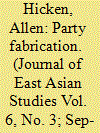

|
|
|
|
|
| Publication |
2006.
|
| Summary/Abstract |
Among the most interesting questions in Thai politics today is how to account for the rise and (until recently) the success of Thaksin Shinawatra and his Thai Rak Thai party. This article describes and analyzes some of the factors that contributed to the rise and success of Thaksin and Thai Rak Thai, arguing that neither Thaksin's personal assets nor the effects of the crisis are enough to explain Thai Rak Thai's rise and success. It focuses instead on the 1997 changes to Thailand 's constitution. These institutional reforms were crucial because they altered Thailand 's political-institutional landscape in fundamental ways. The reforms provided new opportunities and incentives for political actors that Thaksin and his party adeptly took advantage of. The argument presented is that the key reforms that helped pave the way for the rise of Thaksin and Thai Rak Thai were those reforms that helped reduce the number of political parties and that increased the power of the prime minister relative to coalition partners and intraparty factions.
|
|
|
|
|
|
|
|
|
|
|
|
|
|
|
|
| 5 |
ID:
189050
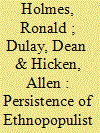

|
|
|
|
|
| Summary/Abstract |
The past few years have seen an emergence of populist leaders around the world, who have not only accrued but also maintained support despite rampant criticism, governance failures, and the ongoing COVID pandemic. The Philippines’ Rodrigo Duterte is the best illustration of this trend, with approval ratings rarely dipping below 80 percent. What explains his high levels of robust public support? We argue that Duterte is an ethnopopulist who uses ethnic appeals in combination with insider vs. outsider rhetoric to garner and maintain public support. Moreover, we argue that ethnic affiliation is a main driver of support for Duterte, and more important than alternative factors such as age, education, gender, or urban vs. rural divides. We provide evidence of Duterte's marriage of ethnic and populist appeals, then evaluate whether ethnicity predicts support for Duterte, using 15 rounds of nationally representative public opinion data. Identifying with a non-Tagalog ethnicity (like Duterte) leads to an 8 percent increase in approval for Duterte, significantly larger than any other explanatory factor. Among Duterte supporters, a non-Tagalog ethnicity is associated with 19 percent increase in strong versus mild support. Ethnicity is the only positive and significant result, suggesting that it strongly explains why Duterte's support remains robust. Alternative explanations, such as social desirability bias and alternative policy considerations, do not explain our results.
|
|
|
|
|
|
|
|
|
|
|
|
|
|
|
|
| 6 |
ID:
081862
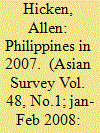

|
|
|
|
|
| Publication |
2008.
|
| Summary/Abstract |
The year 2007 was typically turbulent for the Philippines. Violence-plagued mid-term elections produced a stinging defeat for President Arroyo's Senate team, while corruption scandals spurred another impeachment attempt. The economy was relatively robust, but concerns remain about the country's fiscal health and the long-term effects of a strong peso.
|
|
|
|
|
|
|
|
|
|
|
|
|
|
|
|
| 7 |
ID:
086697
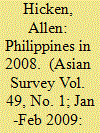

|
|
|
|
|
| Publication |
2009.
|
| Summary/Abstract |
In 2008 the big developments in the Philippines were the signing of a historic and controversial agreement with Muslim rebels, the subsequent scuttling of that agreement by the Supreme Court, and a resumption of hostilities between the government and the Moro Islamic Liberation Front (MILF). Meanwhile, the embattled Arroyo government worked to respond to a series of economic and natural disasters.
|
|
|
|
|
|
|
|
|
|
|
|
|
|
|
|
|
|
|
|
|